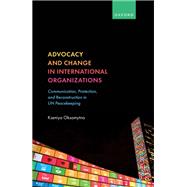Advocacy and Change in International Organizations Communication, Protection, and Reconstruction in UN Peacekeeping
, by Oksamytna, Kseniya- ISBN: 9780192857507 | 0192857509
- Cover: Hardcover
- Copyright: 12/21/2023
How do international organizations change? Many organizations expand into new areas or abandon programmes of work. Advocacy and Change in International Organizations argues that they do so not only at the collective direction of member states. Advocacy is a crucial but overlooked source of change in international organizations. Different actors can advocate for change: national diplomats, international bureaucrats, external experts, or civil society activists. They can use one of three advocacy strategies: social pressure, persuasion, and 'authority talk'. The success of each strategy depends on the presence of favourable conditions related to characteristics of advocates, targets, issues, and context. Institutionalization of new issues in international organizations as a multi-stage process, often accompanied by contestation.
This book demonstrates how the advocacy-focused framework explains the origins of three workstreams of contemporary UN peacekeeping operations: communication, protection, and reconstruction. The issue of strategic communications was promoted by UN officials through the strategy of persuasion. Protection of civilians emerged due to a partially successful social influence campaign by a coalition of elected Security Council members and a subsequent (and successful) persuasion efforts by Canada. Quick impact projects entered peacekeepers' practice as the result of 'authority talk' by an expert panel. The three issues illustrate the diversity of pathways to change in international organizations, representing the top-down, bottom-up, and outside-in pathways. Moreover, they have achieved different degrees of institutionalization in UN's policies, structures, and frameworks: protection of civilians is the most institutionalized, as evidenced by measures to hold peacekeepers accountable for non-implementation, while quick impact projects are the least institutionalized.
This book demonstrates how the advocacy-focused framework explains the origins of three workstreams of contemporary UN peacekeeping operations: communication, protection, and reconstruction. The issue of strategic communications was promoted by UN officials through the strategy of persuasion. Protection of civilians emerged due to a partially successful social influence campaign by a coalition of elected Security Council members and a subsequent (and successful) persuasion efforts by Canada. Quick impact projects entered peacekeepers' practice as the result of 'authority talk' by an expert panel. The three issues illustrate the diversity of pathways to change in international organizations, representing the top-down, bottom-up, and outside-in pathways. Moreover, they have achieved different degrees of institutionalization in UN's policies, structures, and frameworks: protection of civilians is the most institutionalized, as evidenced by measures to hold peacekeepers accountable for non-implementation, while quick impact projects are the least institutionalized.






